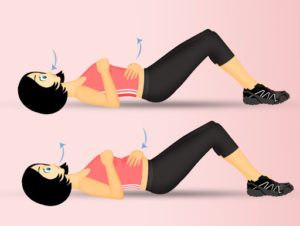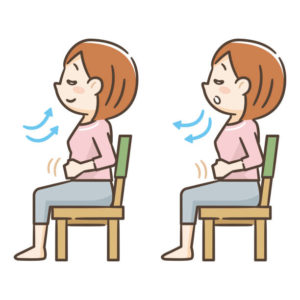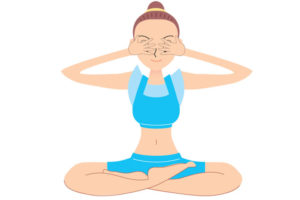Whenever we feel stressed out or alarmed, our adrenal glands release cortisol, the stress hormone, as our body’s natural response to the Fight, fright, and flight reaction that keeps us alert. When the alarm settles, the cortisol levels automatically come down. We live in an accelerating world where stress has become inescapable due to diverse factors in our personal and professional lives, impacting our mental health and physical wellness. As an add-on, the current global pandemic has put us all into fear and despair, triggering our body’s alarms more often than before. So, naturally, the stress levels are high in these current times, putting our mental health in jeopardy. When cortisol is released continuously, it can thwart our body’s immunity and wellness and lead to several health problems, including headaches, heart diseases, respiratory problems, indigestion, weight loss/gain, anxiety disorders, depression, and other mental health issues.
This is where the ancient discipline of Yoga brings back our wellness and rescues our physical and mental health. In the webinar conducted by CecureUs with our expert psychologist, Dr. Lakshmi T.K, she opened us to a whole new world of Yoga and practices for rescuing our physical and mental health during the pandemic. The Asanas help respiratory wellness and immunity. Apart from enlightening us about the science itself, our psychologist has answered a wide range of questions from the audience about the classical science of Yoga and its benefits for physical and mental health.
There are common misconceptions that Yoga is related to religion and spiritual wellness, or it is just another form of physical exercise that aids weight loss or Yoga is a set of breathing techniques or meditation routines. Factually, Yoga is a science, a discipline that helps us achieve a perfect mind-body balance and holistic wellness and mental health, especially during this pandemic. It acts as a natural cleansing system that removes the toxins built up in our body due to continuous cortisol release. Additionally, Yoga also helps our body release the happiness hormone, endorphins, which neutralize the cortisol effect and aid in good mental health and physical wellness by keeping us calm, happy, and relaxed. It is a process of self-realization that brings our mind, body, and consciousness to reality and aids in mental, physical, emotional, and spiritual growth and wellness. Yoga intends to create a balance by aligning our body, breathing, and thoughts in one line. It is a practice that should be incorporated into daily life, mainly during this pandemic, to achieve sound mental health and overall wellness.
Yoga for the Body:
Food, water, and sleep are the three key elements that keep our bodies fit. These entities also contribute significantly to mental health and physical wellness. The food that we eat can be categorized into three types.
Satvik: foods that are pure, light, and sweet
Rajasic: foods that are spicy and stimulating
Tamasic: foods that are heavy and dull
Consuming Satvik and Rajasic foods in regulation and restricting Tamasic foods and fast foods, keeping a check on caffeine, sugar, and alcohol keep us energetic throughout the day and make us feel alive during the work from home times of the global pandemic.
As we all know, 70% of the human body is constituted by fluids, mainly water. Several articles on the internet and in magazines insist on the benefits of consuming the correct quantity of water to feel energetic throughout the day. And the work-from-home scenario of the pandemic has put a cap on our break schedules, leading to lesser consumption of fluids.
Lack of water could
- Impair brain functions, making us feel exhausted, causing fatigue and tiredness, and reducing concentration.
- Undermine the function of kidneys, impacting our overall wellness.
- Produce muscle cramps and joint stiffness, tossing focus during the pandemic work-from-home times.
- Hinder digestion to cause acid reflux, gastritis, and constipation issues.
Our psychologist recommends that drinking 3.5 to 4 liters of water every day will help flush toxins from the body and shield us from mental health issues like anxiety and depression. Mostly, we fail to keep an eye on our water intake. Filling bottles finishing them diligently by the end of the day, and setting timers to remind us to take water at intervals are the steps to be followed in this pandemic work-from-home scenario to keep us on track with our water intake.
Along with food and water, mandatory 8-hour sleep relaxes our brain, keeps it sharp to function well, and avoids mental health issues. Practicing breathing/pranayama before bedtime calms the senses and bestows a night of good sleep for mind-body rejuvenation.
Yoga/Breathing techniques for respiratory wellness:
The breathing techniques that form an integral part of Yoga assist in improving our lung capacity and its functioning and augment respiratory function and wellness. Three prime breathing techniques can be followed as a 15-minute routine every day during this pandemic to keep us away from mental health issues and boost our lungs to perform better, thus helping overall holistic wellness.
Simple Blow Out Breathing Technique:
- Sit comfortably with spine erect/lie down on a flat surface without/with pillows for the neck and underneath the knees.
- While sitting, keep your feet relaxed and firm on the ground.
- Placing the right hand on the abdomen, close your eyes gently.
- Inhale passively and blow out through the mouth.
- While blowing out, feel your abdomen. It should deflate.
- Repeat the process 10 times.

Deep Breathing technique:
- Sit relaxed on a comfortable chair with your spine erect and feet firm on the ground.
- Inhale deeply through your nose and feel the air filling your abdomen.
- Blow out/exhale through the mouth to feel the abdomen deflate.
- Repeat the breathing process 15 times. This breathing can be performed up to 20 or 25 times when a person feels anxious whenever or during this pandemic.
Posture For Deep Breathing

Posture For Deep Breathing
Brahmari Pranayam/ Bee Breathing:
- Sit relaxed on a comfortable chair and place the feet firmly on the ground. Alternately, you can sit on the floor in Padmasana for this breathing.
- Inhale deeply through the nose.
- Cover your ears and eyes with your hands, as shown in the picture.
- Exhale with your mouth closed and make a humming sound that reverberates in your forehead and face as you exhale.
- Repeat the breathing process 15 times.
Posture for Brahmari Pranayam
 Posture for Brahmari Pranayam
Posture for Brahmari Pranayam
This Brahmari Pranayam has innumerable benefits, some being,
- Relieves anger, tension, anxiety, and other mental health issues
- Improves memory and concentration
- Balances the central nervous system and helps alleviate migraines and other forms of headaches
- Boosts confidence
Yoga for the mind:
Practicing simple meditation techniques for just 5 minutes can bring calmness into one’s mind, attributing to physical and mental wellness. However, for meditation, the ambiance plays a predominant role. So whenever we meditate, we have to make sure the place is quiet and void of distractions.
- Sit comfortably in a silent spot with shoulders relaxed and spine erect
- Observe your breathing as you inhale and exhale. Breathe in your own rhythm
- If needed, play soft, relaxing music and utilize essential oils to spread the aroma.
- Without letting the thoughts wander, focus on yourself and your breathing.
Benefits of Yoga for Mental health during the pandemic:
- By paving the way for good sleep, Yoga elevates the mood and outlook of a person and drastically eases the effects of mood swings.
- It gives a clear mind to battle mental health issues(anxiety and depression.)
- It provides clarity of thoughts to make better decisions.
- Yoga helps one with self-realization and wellness and nurtures self-discipline, kindness, and empathy.
- It helps with PTSD symptoms.
Include the science of Yoga into your daily routine and turn it into a habit by following the 21-day discipline. Take that first step towards a better life enriched with physical and mental wellness!
For more such blogs, visit our CecureUs website. Contact Us if you are concerned about yourself or a loved one. Book an Appointment today or Call us. Do not miss out on our Cecureus Wellness Workshops that are being conducted every week to guide you with various coping strategies during the current pandemic.
Image References
- Pranayama – Shiv Holistic Yoga
- Deep Breathing – istockphoto
- Simple Bow Out Techniques – physicalsolutionsli.com





2 Comments